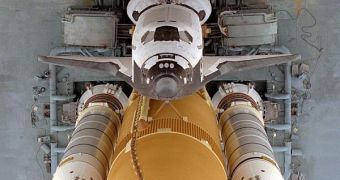The American space agency NASA decided to perform some last-minute adjustments to the schedule of space shuttle Atlantis, which is due to fly the STS-129 (assembly flight ULF3) to the International Space Station (ISS). The launch has been set for November 12, although the actual take-off is still uncertain. There are numerous obstacles that may prevent Atlantis from taking off, but NASA is taking things one step at a time, Space Fellowship reports.
The shuttle will, therefore, be moved to Launch Pad 39A, at the Kennedy Space Center (KSC), in Cape Canaveral, Florida, this Wednesday, rather than Tuesday. It will travel from the Vehicle Assembly Building (VAB) to the launch pad in an estimated six hours aboard the massive Crawler Transporter, the second largest tracked vehicle in the world. During this time, it will cover a distance of about 3.4 miles. The trek itself is expected to begin at about 12:01 am EDT, with reporters being offered a chance to record the moment at around 6.30 am EDT (10:30 GMT).
Though the shuttle was moved from the Orbiter Processing Facility (its hangar) to the VAB last Tuesday, some issues with the crane used for lifting it onto its external fuel tanks have delayed the rollout. The work of engineers became increasingly difficult, as they also had to prepare the new ARES I-X rocket for its own rollout, scheduled for October 19. The launch data for NASA's first new rocket in more than two decades is to take place on October 27.
There were severe difficulties facing Atlantis in its quest for launch, NASA officials said recently. The increased space traffic, incoming meteor showers, and a very narrow launch window may force mission planners to either delay the launch, or move it to next year altogether. Between November 21 and December 5, the orbital facility will receive sunlight from an angle that will not allow it to generate sufficient electricity to support a docked shuttle. Additionally, the station would be unable to dissipate the heat that such a maneuver would generate. When Atlantis lifts, it will only carry six astronauts, as opposed to the usual seven.
Additionally, on November 17, the Leonid meteor shower will peak, followed by the Geminids, on December 13-14. A new communication satellite will be launched from a United Launch Alliance Atlas 5 rocket on November 14, followed, four days later, by a Delta 4 rocket launch. To top things, the US Air Force Eastern Range, the installation that provides space-tracking capabilities for all launches from the Kennedy Space Center and the Cape Canaveral Air Force Station, in Florida, needs between 24 and 48 hours to reset its systems.

 14 DAY TRIAL //
14 DAY TRIAL //